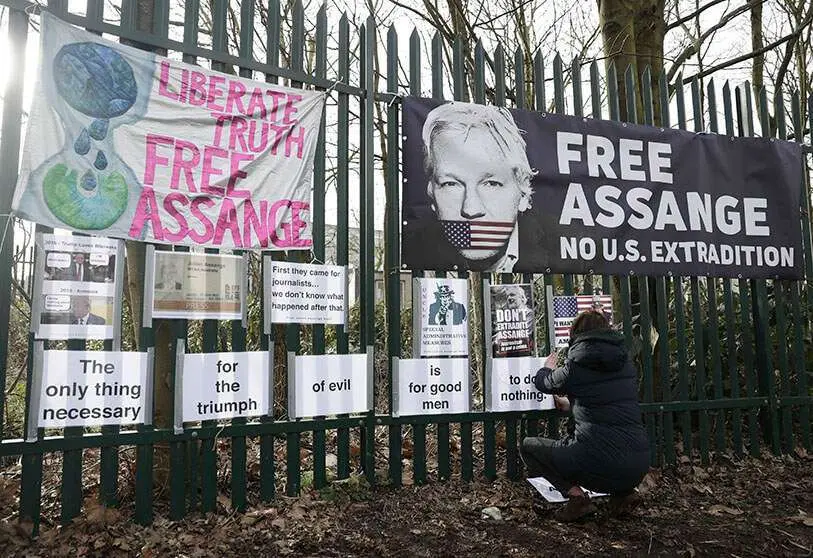The Assange trial and the future of journalism

Woolwich is a district of the town of Greenwich in East London. It has the particularity, known worldwide, that the main meridian of the planet is located there, which marks the coordinated time of all the countries of the world and their timetable uses. The inhabitants of this municipality are proud of this and of the importance that their geographical location has for the rest of the world. This corner by the Thames is where the courthouse is located, where the hearing for the extradition of Julian Assange is taking place and is attracting worldwide attention. The court is presided over by Judge Vanessa Baraitser, and occupies one of the rooms of the judicial building located barely two hundred meters from Her Majesty's Prison (HMP) in Belmarsh, where the prisoner has spent the last ten months, nothing to do with the comforts or inconveniences he had at the Ecuadorian embassy near Hyde Park.
This is the hearing for Assange's extradition to the United States, a country that is claiming him for 18 crimes and could sentence him to up to 175 years in prison. The first week of this trial ends after reports from the US administration and the Australian journalist's defence were presented. His defender is the tough Edward Fitzgerald, who has been dialectically measuring himself daily for the past five days against the lawyer representing the district of Eastern Virginia, James Lewis. Assange, a computer expert turned journalist, is accused of violating a handful of articles in the US espionage law and a further offence of inciting computer fraud. Together with intelligence analyst Chelsea Manning, Assange had access to confidential army reports and information published in 2010 on the Wikileaks website, including almost half a million files, 100,000 of which were on the Iraq war. The contributions to public opinion of those crimes of Assange allowed us to discover episodes of torture of detainees in Guantanamo or operations of American fighter-bombers in civilian areas of Baghdad. The publication was an impeccable act of journalistic independence.
But the publication of those documents, which Lewis is defending in court, put the lives of U.S. collaborators and informants in the wars in Iraq and Afghanistan at risk. He compromised the integrity of individuals by publishing those videos and papers. He put in jeopardy thousands of official secrets, which the United States has just like any other country in the world, destined for the defense and security of its citizens. Now the world's left has taken up the cause against Assange as a transcendental symbol of the risks that journalism and freedom of information, the defence of the truth and the publication of all relevant information, affect whoever they affect.
The problem lies in the fact that, once again, the focus is being deliberately diverted to create a just universal cause against which no one can have a single objection. The pro-Assange crusade is trying to make people believe that what the US wants to judge and punish is the publication of the Pentagon dossiers, and it calls it an attack on freedom. But the reality is that the criminal claim made by the American administration has to do with the theft of classified material. Anyone who reads the charges will see that the charge is for conspiracy to infiltrate public computers, cracking the key to a government computer with classified information, hacking into computers with official secrets. The indictment claims that Asssange conspired with Manning to obtain classified information, taking advantage of the latter's work at the Department of Defense, and that same indictment believes that this information was to be used to harm the United States or benefit a foreign country. Journalism is not an excuse to break criminal laws. And this is not a debate between state secrets and investigative journalism. It is something very different that is being used, like so many other things, in an ideological way to impose a certain way of seeing the world.
The Assange who is being defended in this way has violated the conditions of his parole in the United Kingdom, which is why he has been held in Belmarsh since he was handed over by the Ecuadorian authorities. The Swedish prosecutor's office has closed the case of the alleged violations he committed on its territory, but has done so by confirming the credibility of the young complainant's story, which is "credible and reliable" according to prosecutor Eva-Marie Persson. Only the loss of value of the evidence exempts the journalist from these charges for the time being. Interestingly, the world's crusade does not say a word about this Assange. Nor of the Assange who published a tweet every twelve minutes from his refuge in the embassy encouraging the commission of crimes in Spain during the independence coup in October 2017. It is also paradoxical that the spying to which Assange was subjected during the years that his asylum in the diplomatic legation lasted is now being reported: the best known of the spies, spied on in his own captivity. A report that borders on the ridiculous.
All this distracts attention from the crucial issue: Manning allegedly hacked into a Pentagon computer with Assange's collaboration, and here it is being purported that there is no recrimination against them because that would mean the end of universal journalism.

